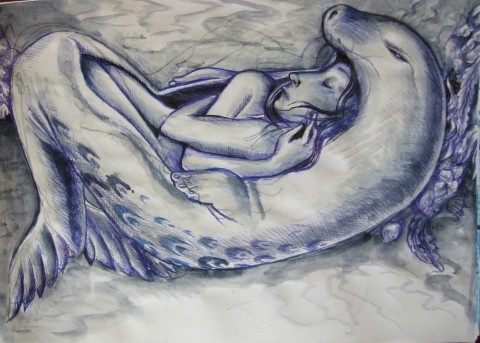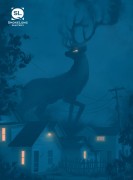My mother is a selkie. She loans out her sealskin so everyone else can taste the water. She stays on land like fuchsia, bright and drooping in the rain. She warns that I will be like her. My spirit is strong but divisible. Of all her children, I am more seal than person. The fish I catch, I share. The men I catch, I release to sisters and brothers who are more than the world can take, steady with focused lips.
I stay among the waves. Between the slits of my own over-shared pelt, I prune.
Looking on, my mother spits up seaweed and cod for our breakfast. I wriggle onto the shore and join my sisters and brothers as they laugh and dance around her. She will never learn that we can take care of ourselves, that we mash the tide with feet and fists. And they have all forgotten I was the one who caught the cod in the first place—before her long teeth hollowed it and made its spine a necklace.
I tie my pelt at my waist while my siblings build a bonfire. They skewer squash and turnips and navigate them through the flames, giggling and shoving each other when the juice hisses onto hot coals.
Our mother hooks the last bulb of kelp out of her cheek and wipes her face. Grinding fronds into the beach, she steps back from the fire. She wants to love the land but everything here scares her. She cannot understand why blood does not dissipate in air as it does in water. In the ocean, gravity is a specter. She can watch death fall, or swell and float. Why did we need to entomb my father? Dry or wet, weren’t the worms enough.
My sisters and brothers laugh and drink things grown in soil and left to rot and fizz. Our mother wrinkles her nose and asks to please pass the brine. She only pokes at her chunk of butternut. I scoop up the cod and offer it to her, but sand precipitates from my fingers, and she just shakes her head.
My mother is an argument left septic, full of mercury. Up the food chain but only looking out at that sea of pickled green. Wrasse freckle the surface and open their mouths to bubble taunts. Look past them, I tell her. Come. Swim with me.
She won’t. She has forgotten how to tell the difference between the shadows of clouds and other dark shapes in the water.
Out at sea, a ship sinks. I slide on my pelt, pinch the gaps, and wade through the tossing surf. Men bob like apple trees in a storm. They are no match for the waves I pierce. My sisters and brothers have not yet seen them for staring into the fire. I can take my pick. I snatch a rogue net and circle the sailors, and they are grateful when I press my lips to them, giving first life, then an ache they will carry forever. I will not be like my mother. I will not share my catch nor my pelt any longer.
There is one man in a broken raft pulling others to safety. I meet his eyes and slip off my sealskin. My white feet are glowing fish to the sharks below. I hold out the skin—a test. If he fails, I will bite his hand and drag him to the depths. Take it, I say. He doesn’t take it. He points to my net of sailors. Can I get them to shore?
I climb back into my pelt and swim for the sand, chewing through the net and a few men along the way. With shreds of my mother’s borrowed skin, my sisters and brothers plunge through the waves. I bare my teeth until they mewl like lost pups, then I lick the sailors’ blood from my whiskers. The man in the raft has rowed away, but that is fair. That is fair.
The sun catches the black nest of my mother’s head. She stands on a cliff, gripping what is left of her tattered pelt. Push her and I will save her—if she can remember how to dive. Or will she hold herself close and let out her breath, finally understanding what it is to be a rock?



 The core workshop of SmokeLong Fitness is all in writing, so you can take part from anywhere at anytime. We are excited about creating a supportive, consistent and structured environment for flash writers to work on their craft in a community. We are thrilled and proud to say that our workshop participants have won, placed, or been listed in every major flash competition. Community works.
The core workshop of SmokeLong Fitness is all in writing, so you can take part from anywhere at anytime. We are excited about creating a supportive, consistent and structured environment for flash writers to work on their craft in a community. We are thrilled and proud to say that our workshop participants have won, placed, or been listed in every major flash competition. Community works.